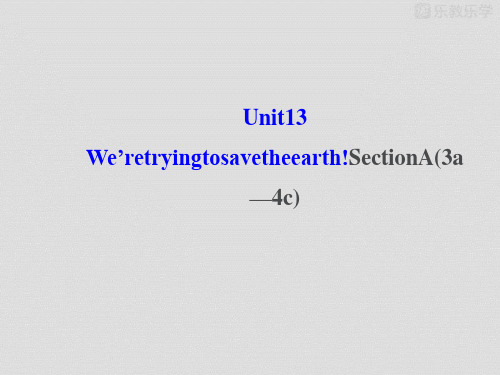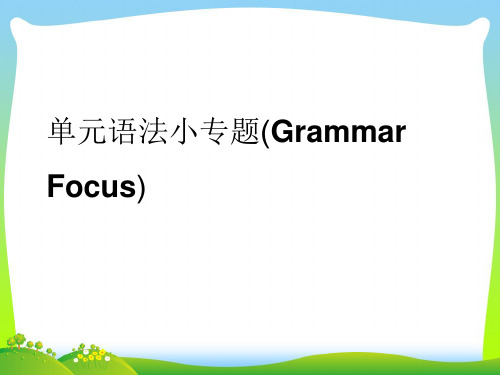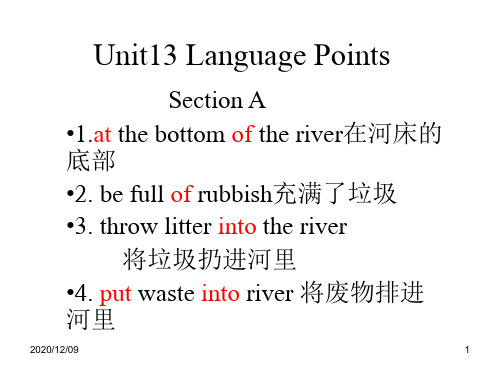最新人教版九年级英语unit13短语句型和语法课件
合集下载
人教版九年级英语unit13短语句型和语法课件-文档资料

新目标 九年级 Unit 13
九年级新目标
Unit 13
Rainy days make me sad.
人民教育电子音像出版社出版
• • • •
经典句型(新版块) 1.高亢的音乐是我精神紧张。 2.你是怎样看待污染(问题)的? 3.因此接受的艺术或许比给予的艺术更难!
• • • • • • •
经典句型(新版块) 1.高亢的音乐是我精神紧张。 Loud music makes me tense. 2.你是怎样看待污染(问题)的? How do you feel about pollution? 3.因此接受的艺术或许比给予的艺术更难! So maybe the art of receiving mis even more difficult than the art of giving!
单词
• • • • • • • n. 泻湖;环礁湖 adj. 科学的 adv. 因此,所以 adj. 粉红色的; n. 照明,光线; adj. 坚硬的;坚固的 v.(为......)服务,招待; 端上(饭菜等) • adj. 公平的,公道的
lagoon scientific therefore pink lighting hard serve fair
• • • • •
n. 美,美貌 n.牙膏 不让...进入 n. 星团;幻觉 n.,广告; 广告活动;广 告业 • 赞成与反对,正面和反 面 • v.瞄准,对准 • 瞄准,针对;致力于; 旨在
beauty toothpaste stardust advertising pros and cons aim aim at
• 4.因此许多快餐店使用红色的家具或墙壁。 • Many fast food restaurant,therefore,have red furniture or walks. • 5.柔和的灯光使人看上去精神不错。 • Soft lighting makes people look good. • 6.硬座位也使顾客想快点吃并且迅速离开。 • Hard seats also make customers want to eat quickly and leave.
九年级新目标
Unit 13
Rainy days make me sad.
人民教育电子音像出版社出版
• • • •
经典句型(新版块) 1.高亢的音乐是我精神紧张。 2.你是怎样看待污染(问题)的? 3.因此接受的艺术或许比给予的艺术更难!
• • • • • • •
经典句型(新版块) 1.高亢的音乐是我精神紧张。 Loud music makes me tense. 2.你是怎样看待污染(问题)的? How do you feel about pollution? 3.因此接受的艺术或许比给予的艺术更难! So maybe the art of receiving mis even more difficult than the art of giving!
单词
• • • • • • • n. 泻湖;环礁湖 adj. 科学的 adv. 因此,所以 adj. 粉红色的; n. 照明,光线; adj. 坚硬的;坚固的 v.(为......)服务,招待; 端上(饭菜等) • adj. 公平的,公道的
lagoon scientific therefore pink lighting hard serve fair
• • • • •
n. 美,美貌 n.牙膏 不让...进入 n. 星团;幻觉 n.,广告; 广告活动;广 告业 • 赞成与反对,正面和反 面 • v.瞄准,对准 • 瞄准,针对;致力于; 旨在
beauty toothpaste stardust advertising pros and cons aim aim at
• 4.因此许多快餐店使用红色的家具或墙壁。 • Many fast food restaurant,therefore,have red furniture or walks. • 5.柔和的灯光使人看上去精神不错。 • Soft lighting makes people look good. • 6.硬座位也使顾客想快点吃并且迅速离开。 • Hard seats also make customers want to eat quickly and leave.
人教版英语九年级Unit13We’retryingtosavetheearth!SectionA(3a—4c)课件

的。 Manybelievethatsharks intheirfoodchain. 4.世界各地的环境保护组织,如野生救援协会和世界自然基金 会,教育公众有关“猎翅”的行为。 Environmentalprotectiongroupsaroundtheworld, WildAidandtheWWF, never becausetheyare
【知识构建】 现在完成时的用法 :1. 表示过去发生或已经完成的动作对 现在造成的影响或结果。 2. 表示从过去已经开始 , 一直持续到 现在的动作或状态。 时间状语 :already,yet,never,for+ 时间状语 ,since+ 表过去的时间 点等。 Ihavealreadyfinishedmyhomework. 我已经做完我的家 庭作业了。
1.takepartin参加
【语境领悟】
*Howmanypeopletookpartin? 多少人参加了? *ShejoinedtheYoungPioneers. 她加入了少先队。 *Willyoujoinusinthediscussion? 你要参加我们的讨论吗?
【妙辨异同】“参加”的不同表达
【归纳拓展】
和 usedtodo 结构相似的表达还有 be/get/becomeusedtodoing 和 beusedtodo。 (1)be/get/becomeusedtodoing意为“习惯于做……”。 Mygrandfatherisusedtogoingforawalkafterdinner. 我爷爷习惯晚饭后去散步。 (2)beusedtodo 意 为 “ 被 用 来 做 ” , 是 被 动 语 态 , 相 当 于 beusedfordoing。
1.Whereisthesharkfinsoup especiallypopular?
【知识构建】 现在完成时的用法 :1. 表示过去发生或已经完成的动作对 现在造成的影响或结果。 2. 表示从过去已经开始 , 一直持续到 现在的动作或状态。 时间状语 :already,yet,never,for+ 时间状语 ,since+ 表过去的时间 点等。 Ihavealreadyfinishedmyhomework. 我已经做完我的家 庭作业了。
1.takepartin参加
【语境领悟】
*Howmanypeopletookpartin? 多少人参加了? *ShejoinedtheYoungPioneers. 她加入了少先队。 *Willyoujoinusinthediscussion? 你要参加我们的讨论吗?
【妙辨异同】“参加”的不同表达
【归纳拓展】
和 usedtodo 结构相似的表达还有 be/get/becomeusedtodoing 和 beusedtodo。 (1)be/get/becomeusedtodoing意为“习惯于做……”。 Mygrandfatherisusedtogoingforawalkafterdinner. 我爷爷习惯晚饭后去散步。 (2)beusedtodo 意 为 “ 被 用 来 做 ” , 是 被 动 语 态 , 相 当 于 beusedfordoing。
1.Whereisthesharkfinsoup especiallypopular?
(新人教版)英语九年级全册:Unit 13 全单元ppt课件(223页)

1c
The river was dirty. Even the bottom of the river was full of rubbish.
But it used to be so clean!
Yes, but people are throwing litter into the river.
Yes, everyone in this town should play a part.
We should write to the government and ask them to close down the factories.
What else can we do?
Everyone should help to clean up the river.
bring a bag to go shopping. use chopsticks or forks at home.
throw rubbish in the bins.
Jason and Susan, what are your ideas for solving these problems?
litter和rubbish都可指“垃圾”,用作 不可数名词。 rubbish指“没用的东西(被扔或将要丢 弃的无用的东西)‖不可回收。
litter指“(室内或公共场所)乱扔的废物 (纸屑、不要的包装纸、废瓶等)‖还可 回收。 e.g. Throw the rubbish out. 把垃圾扔出去。 The room is full of rubbish. 房间里堆满了垃圾。 Pick up your litter after a picnic. 野餐后将废弃物收拾好。
The earth is polluted.
Unit 13 (Grammar focus-4c)课件 2022-2023学年人教版九年级英语全册

句中会有感官动词来提示,或通过上下文来暗示。 ②表示现阶段一直进行的动作。这类动词常常是延续性动词。常与
at present, this week, these days等连用。 ③表示主语的特征、性格、能力等。
Grammar Focus
➢used to句型
used to意为“过去常常做某事”,指的是过去的习惯性动作,目的在于 与现在形成对照。used to是个情态动词,其中的to是不定式符号,后面 跟动词原形。 在美式英语中,它的疑问式是:Did +主语+use to do sth.?否定式是:主 语+didn't use… 在英式英语中,它的疑问式应当是:Used +主语+to do sth.?否定式应 当是used not to do sth.或use(d)n’t to do sth.。 He used to stay up late. 他过去常熬到很晚。
great idea that you now h_a_v_e__t_o pay for plastic bags in
some stores. And instead of driving to school or work,
you _c_a_n_/s_h_o_u__ld_ ride your bike or walk. If it’s far, you
6. How long h__a_s_ Sally s_u__n_g_ (sing) yet?
用所给词的适当形式填空。 1. The old man used ___to__be(be) a teacher. 2. We should _c_le_a_n_ (clean) the room every day. 3. Look! Tom _i_s_s_l_ee_p_i_n_g(sleep) in his room. 4. Lots of trees _a_r_e_p_l_a_n_te_d_ (plant) on the hill every year. 5. He _h_a_s_l_iv_e_d__ (live) here for 20 years.
at present, this week, these days等连用。 ③表示主语的特征、性格、能力等。
Grammar Focus
➢used to句型
used to意为“过去常常做某事”,指的是过去的习惯性动作,目的在于 与现在形成对照。used to是个情态动词,其中的to是不定式符号,后面 跟动词原形。 在美式英语中,它的疑问式是:Did +主语+use to do sth.?否定式是:主 语+didn't use… 在英式英语中,它的疑问式应当是:Used +主语+to do sth.?否定式应 当是used not to do sth.或use(d)n’t to do sth.。 He used to stay up late. 他过去常熬到很晚。
great idea that you now h_a_v_e__t_o pay for plastic bags in
some stores. And instead of driving to school or work,
you _c_a_n_/s_h_o_u__ld_ ride your bike or walk. If it’s far, you
6. How long h__a_s_ Sally s_u__n_g_ (sing) yet?
用所给词的适当形式填空。 1. The old man used ___to__be(be) a teacher. 2. We should _c_le_a_n_ (clean) the room every day. 3. Look! Tom _i_s_s_l_ee_p_i_n_g(sleep) in his room. 4. Lots of trees _a_r_e_p_l_a_n_te_d_ (plant) on the hill every year. 5. He _h_a_s_l_iv_e_d__ (live) here for 20 years.
Unit13SectionA(Grammar_Focus4c)课件人教版九年级英语全册

I think it’s a great idea that you now _s_h_o_u_l_d_ pay for plastic bags in some stores. And instead of driving to school or work, you _c_a_n____ ride your bike or walk. If it’s far, you _h_a_v_e__to__ take the bus. All these small things _c_a_n___ add up and become big things that _w__o_u_ld__ improve the environment. Let’s take actions now!
B: I agree. It's good for the environment.
Exercises
Ⅰ.选择正确的形式填空。 1. Nick _w__a_s_o_f_f_e_re_d__ (offer) a job in a bank, but to our surprise, he
didn’t take it. 2. — Have you heard of the Earth Day?
Ken: Yes, we can’t afford to _w_a_i_ti_n_g_ (wait) any longer to take action!
4b Fill in the blanks with the appropriate modal verbs from the box.
can would could have to should must may/might
for the time being, at present, …
人教版九年级英语第13单元语法精讲精练与写作PPT

( B )8.—(2019 包头) It won’t take long.
—Okay. A.Should C.Need
I have a word with you,Mr.Green?
B.May D.Must
( A )9.—(2019 云南) I’ve got a toothache,Mom.
—Oh,you
(二) 单元话题句子积累
1.我们的环境正变得越来越糟。
Our environment is becoming worse and worse .
2.它不仅可以保护环境,而且对我们的健康有好处。
It not only can protect the environment, but also is good for
our health.
3.保护环境是每个人的责任。
It is everyone’s duty
to protect the environment.
【写作典例】 假如你校英文报近期开展“保护环境,从我做起”的主题演讲活动, 要求每位学生写一封倡议书,号召全校师生从小事做起,维护我们赖以 生存的环境。请你据此写一封英文倡议书。 要求:1.语句通顺,语法正确,可适当发挥; 2.词数 80 左右。
9.All passengers must go through safety check before they take a plane.
10.The man in the office can’t be Mr. Black,because he went home just now.
Unit 13 We’re trying to save the earth!
could could 既是 can 的过去式,本身也是情态动词,语气较为委婉。
新人教版九年级英语 Unit13 单元语法小专题.ppt

best.你是汤姆的好朋友,你一定知道他最喜欢什么。 (4)should,ought to (客观推测),must(主观推测)。如: He must be home by now.他现在一定回家了。(断定他已到 家) He ought to/should be home by now.他现在应该到家了。 (按理应当,不太肯定)
to work countryside.
to break 16. All of us know that cotton can be used ________ (make)
asking cloth. 17. You used ________ (go) to school by bike,didn't you?
might比 may语气更委婉,而不是过去式。否定回答时可用 can't或mustn't,表示“不可以,禁止”。 用“May I…?”征询对方许可时比较正式和客气,而用 “Can I…?”在口语中更常见。 ②用于祈使句,表示祝愿。如: May you succeed!愿你成功!
习本吗? —Yes,you must.(No,you don't have to/you needn't.)是的,你 们必须今天交。(不,你们不一定要今天交。) ②must是说话人的主观看法,而have to则强调客观需要。must只 有一般现在时,而have to 有更多的时态形式。如: I had to work when I was your age.我像你这么大时,就必须工作 了。
3. —________ I finish the work right now?
—No,you ________ (not).You ________ do it later. must
Unit+13-Unit+14重点短语 句型课件 人教版九年级英语全册

重点句型 1.他因使用旧汽车的铁和其他材料来制作美丽的艺术品而出 名。 He is known/famous for using iron and other materials from old cars to make beautiful art pieces. 2.Amy不是唯一一个擅长回收利用的人。
What are you looking forward to?
4.在七年级发生了什么特别的事吗? What happened in Grade 7 that was special?
5.我已经变得更擅长说英语。 I have become much better at speaking English.
Unit 14 I remember meeting all of you in Grade 7.
Amy isn’t the only one who is good at recycling.
3.她还建立了一个网站,在网上出售它们。 She has also set up a website to sell them online.
4.你可能从未听说过Amy Hayes。 You have probably never heard of Amy Hayes.
The air is badly polluted.
Unit 13 We’re trying to save the earth!
Section B
重点短语
1.扔掉,抛弃 throw away_ 2.擅长 be good at _ 3.成立,建立 set up _ 4.在……前面 in front of _ 5.由……制成(看不见原材料) be made from_ 6.好好利用某物 put sth.to good use _ 7.拆下;摧毁 pull…down _ 8.上下颠倒;倒转 upside down _ 9.恢复 bring back _
人教版PEP初中九年级英语Unit 13第五课时 语法焦点与同步作文指导优秀课件

Let’s take action and be low-carbon pe
各种时态的被动语态形式为: 1)一般现在时 am/is/are +done (过去分词) 2)现在完成时 has /have been done 3)现在进行时 am/is /are being done 4)一般过去时 was/were done 5)过去完成时 had been done 6) 过去进行时 was/were being done 7)一般将来时 shall/will be done 8)过去将来时 should/would be done
语法焦点
一、 used to句型复习
used to为固定结构,意为 “过去经常、以前常常”,后跟动词原形, 表示过去存在某种状态或者过去的某种经常性、习惯性的行为或者动 作,并意味着这种动作目前已经不存在,所以它只能用一般过去时。 肯定形式:主语+used to+动词原形。 否定形式:主语+didn’t+use to+动词原形。 一般疑问句形式:Did+主语+use to+动词原形+其他? 注意:be used to do something意为 “被用来做某事”,是动词短语use ...to do的被动语态结构; be used to doing something意为 “习惯于做某事”,to的后面用动名词 ,它可以用现在,过去和将来等时态,be可以用get,become连系动词 代替。
语法焦点
二、被动语态复习
特殊用法: 1)带情态动词的被动结构。其形式为: 情态动词+be+过去分词。 2)在主动语态中,像make, see, watch, hear, let, notice等动词后省略to的动词 不定式,在变为被动语态时,一定要把省去的to补上。 3)带有双宾语的动词变为被动语态时,一般把间接宾语变为被动语态的主语 ,如果把直接宾语变为被动语态的主语,则需要在间接宾语前加上介词to或 for。常用介词to的动词有:give, leave, send, pass, bring, lend, teach…常用介 词for的动词有:buy, make, sing, draw… 4)由介词或副词组成的短语动词变为被动语态时,短语动词要保持完整性, 介词或副词也不能漏掉。
各种时态的被动语态形式为: 1)一般现在时 am/is/are +done (过去分词) 2)现在完成时 has /have been done 3)现在进行时 am/is /are being done 4)一般过去时 was/were done 5)过去完成时 had been done 6) 过去进行时 was/were being done 7)一般将来时 shall/will be done 8)过去将来时 should/would be done
语法焦点
一、 used to句型复习
used to为固定结构,意为 “过去经常、以前常常”,后跟动词原形, 表示过去存在某种状态或者过去的某种经常性、习惯性的行为或者动 作,并意味着这种动作目前已经不存在,所以它只能用一般过去时。 肯定形式:主语+used to+动词原形。 否定形式:主语+didn’t+use to+动词原形。 一般疑问句形式:Did+主语+use to+动词原形+其他? 注意:be used to do something意为 “被用来做某事”,是动词短语use ...to do的被动语态结构; be used to doing something意为 “习惯于做某事”,to的后面用动名词 ,它可以用现在,过去和将来等时态,be可以用get,become连系动词 代替。
语法焦点
二、被动语态复习
特殊用法: 1)带情态动词的被动结构。其形式为: 情态动词+be+过去分词。 2)在主动语态中,像make, see, watch, hear, let, notice等动词后省略to的动词 不定式,在变为被动语态时,一定要把省去的to补上。 3)带有双宾语的动词变为被动语态时,一般把间接宾语变为被动语态的主语 ,如果把直接宾语变为被动语态的主语,则需要在间接宾语前加上介词to或 for。常用介词to的动词有:give, leave, send, pass, bring, lend, teach…常用介 词for的动词有:buy, make, sing, draw… 4)由介词或副词组成的短语动词变为被动语态时,短语动词要保持完整性, 介词或副词也不能漏掉。
人教版九年级Unit 13课本重要的知识点PPT教学课件

• eg:The desks are made of wood. It is made by the workers in Wuhan. 那些桌 子是由木头制成的。他们是由武汉的 工人造的
The paper is made from wood.纸是由木 头制成的。
China is made in China。瓷器是中国造
事
• 33.take action (to do)采取行动(干某事 • 34.add up (to) 累加/加起来
2020/12/09
7
Section B
• 1.ride in cars 开小汽车
• 2.turn off the shower 关淋浴
• 3. throw away 扔掉
• 4. recycle books and paper回收书和纸
2020/12/09
3
• 15. take buses/subway instead of driving • 乘公汽/地铁代替开车
• 16. the advantage/disadvantage of doing sth. 干某事的有利/不利方面
• 17.takeaway food方便食品 • 18.make a difference 产生影响 • 19.lead to a better future通往更好的未来
• 28.develop laws 健全法律 • 29. the sale of shark fin鱼鳍买卖
2020/12/09
6
• 30.so far=up to now到目前为止 • 31.take part in 参加(活动) • 32. can’t afford to do sth.负担不起做某
人教版新目标九年级Unit13课件

构成
肯定句:
used to + 动词原形 否定句:
主语 + didn't use to… 一般疑问句:
Did+主语+use to do sth.?
情态动词
情态动词用来表示能力、应该、请求、推测等, 后接动词原形。情态动词(除have to以外)没有人 称和数的变化。
1.表示“能力”的情态动词。
1) — ________ your Australian friend eat with chopsticks? — Yes, but she can’t use them well. A. Should B. Need C. Can D. Must
谓语动词 be (not) + done (V-ed)
肯定句: 主语 + be + V-ed (+ by…). 否定句: 主语 + be + not + V-ed (+by…). 一般疑问句: Be + 主语 + V-ed (+by…)? 特殊疑问句: 疑问词 + be + 主语 + V-ed (+by…)?
2) 动作发生在过去,强调对现在的结果、 影响等。
Our city has already changed a great deal. 我们的城市已经发生了很大的变化。
(结果:现在城市面貌焕然一新)
3) 表示动作发生在过去,并且一直持续到 现在,甚至还可能继续下去,句中使用 持续性动词,且常有表示一段时间的时 间状语。
② He is always helping others. 他总是帮助别人。(他真是个好人。)
人教版九年级英语unit13全单元课件

Section 3
Choose an adjective from the reading that expresses a feeling. To “make the word your own”. Write about a time when you felt this way.
________________________________ ____________________________________ ____________________________ ________________________________
John Wilson
How would he feel? Comfortable or uncomfortable?
Uncomfortable.
counts, saying, thought, uncomfortable
To make things easier, some people would rather just give money. In some cultures, however, receiving money can make peopleun__co_m__f_o_r_ta_b_l_e__. “When someone gives格m言e money, 想it j法ust最m重ak要es。me think they’re being lazy,” says John Wilson. “In England, we have a _s_a_y_in__g__: It’s the thought that _co_u__n_ts__. When someone gives me money, I feel they didn’t think at all.I prefer to receive a gift that has some _th_o_u_g_h_t_ behind it. I don’t mind if it’s something I don’t need. If someone has thought about a gift for me, it always makes me happy.”
- 1、下载文档前请自行甄别文档内容的完整性,平台不提供额外的编辑、内容补充、找答案等附加服务。
- 2、"仅部分预览"的文档,不可在线预览部分如存在完整性等问题,可反馈申请退款(可完整预览的文档不适用该条件!)。
- 3、如文档侵犯您的权益,请联系客服反馈,我们会尽快为您处理(人工客服工作时间:9:00-18:30)。
人教版九年级英语unit13短 语句型和语法课件
九年级新目标
Unit 13 Rainy days make me sad.
人民教育电子音像出版社出版
• 首先, • adj.紧张的;焦虑的 • adj.自制的,家里做的 • n. 书包 • adj. 紫色的; • n. 钱包,女用钱包 • adj. 内疚的,有罪的, • n. 品味;审美力;鉴
money.
• 6.像粉红色和浅蓝色这些柔和的色调能使人放 松,所以顾客愿意在这样的餐馆里花费更多的 时间来用餐。
• Soft colors like pink and light blue make people relaxed,so they spend more time eating their meals.
赏力
to start with tense home-made schoolbag purple purse guilty taste
• n.格言;谚语;警句 • n.思想;想法;考虑;
关心
• v.有价值;重要
saying thought count
九年级英语
短语句型
• 1.宁可;宁愿 • would rather • 2.遮挡阳光 • keep out the sun • 3.瞄准;针对 • aim at • 4.例如 • for instance • 5.有时;偶尔 • at times
Unit13 Rainy days make me sad.
Section A
• 1.我更喜欢去蓝色泻湖餐馆,因为我喜欢边听 轻音乐边吃饭。
• 2.它如此悲伤,以至于我们都哭了。 • 3.这是他们从科学研究中学到的一些东西。 • 4.因此许多快餐店使用红色的家具或墙壁。 • 5.柔和的灯光使人看上去精神不错。 • 6.硬座位也使顾客想快点吃并且迅速离开。 • 7.小餐馆每天能够招待许多客人。 • 8.你认为一些餐馆设计成使人不舒服的合理吗? • 9.让你久等的人
• Many restaurants,especially fast food restaurants,use this knowledge to make customers eat faster.
• 1.艾米和蒂娜认为这两家餐馆怎么样? • 2.可怕的图画使艾米难过。 • 3.等她使我很生气。 • 4.它们只会使我想离开! • 5.他们还必须知道怎样赚钱。 • 6.像粉红色和浅蓝色这些柔和的色调能使人放松,
所以顾客愿意在这样的餐馆里花费更多的时间来 用餐。
• 7.高亢的音乐起初可能很好...... • 8.硬座位也使顾客想要快点吃完离开。 • 9.许多餐馆,尤其是快餐店,用这种知识来使顾
客吃得更快一些。
• 10.你怎样看待污染(问题)的? • 11.它使我想加入清洁行动。
• 1.艾米和蒂娜认为这两家餐馆怎么样? • What do Amy and Tina think of the two
restaurant? • 2.可怕的图画使艾米难过。 • The awful pictures make Amy sad. • 3.等她使我很生气。 • Waiting for her made me angry. • 4.它们只会使我想离开! • They just make me want to leave! • 5.他们还必须知道怎样赚钱。 • They also have to know how to make
• 7.小餐馆每天能够招待许多客人。 • Small restaurants can serve many people
every day. • 8.你认为一些餐馆设计成使人不舒服的合理吗? • Do you think it’s fair that some restaurant
are designed to be uncomfortable? • 9.让你久等的人 • people who keep you waiting
• 6.首先 • to start with • 7.根本不;一点儿也不 • not...at all • 8.毕竟;终究 • after all • 9.留给某人某物 • leave sb sth • 10.说实话 • to be honest
• 11.以最低的价格 • with the lowest price • 12.向......学习 • learn from...
red furniture or walks. • 5.柔和的灯光使人看上去精神不错。 • Soft lighting makes people look good. • 6.硬座位也使顾客想快点吃并且迅速离开。 • Hard seats also make customers want to
eat quickly and leave.
• 1.我更喜欢去蓝色泻湖餐her go to the Blue Lagoon Restaurant because I like to listen to quiet music while I’m eating.
• 2.它如此悲伤,以至于我们都哭了。
• I was so sad that it made us cry. • 3.这是他们从科学研究中学到的一些东西。
• Here are some things they’re learned from scientific studies.
• 4.因此许多快餐店使用红色的家具或墙壁。 • Many fast food restaurant,therefore,have
• 7.高亢的音乐起初可能很好......
• Loud music may be nice at first... • 8.硬座位也使顾客想要快点吃完离开。
• Hard seats also make customers want to eat quickly and leave.
• 9.许多餐馆,尤其是快餐店,用这种知识来使 顾客吃得更快一些。
九年级新目标
Unit 13 Rainy days make me sad.
人民教育电子音像出版社出版
• 首先, • adj.紧张的;焦虑的 • adj.自制的,家里做的 • n. 书包 • adj. 紫色的; • n. 钱包,女用钱包 • adj. 内疚的,有罪的, • n. 品味;审美力;鉴
money.
• 6.像粉红色和浅蓝色这些柔和的色调能使人放 松,所以顾客愿意在这样的餐馆里花费更多的 时间来用餐。
• Soft colors like pink and light blue make people relaxed,so they spend more time eating their meals.
赏力
to start with tense home-made schoolbag purple purse guilty taste
• n.格言;谚语;警句 • n.思想;想法;考虑;
关心
• v.有价值;重要
saying thought count
九年级英语
短语句型
• 1.宁可;宁愿 • would rather • 2.遮挡阳光 • keep out the sun • 3.瞄准;针对 • aim at • 4.例如 • for instance • 5.有时;偶尔 • at times
Unit13 Rainy days make me sad.
Section A
• 1.我更喜欢去蓝色泻湖餐馆,因为我喜欢边听 轻音乐边吃饭。
• 2.它如此悲伤,以至于我们都哭了。 • 3.这是他们从科学研究中学到的一些东西。 • 4.因此许多快餐店使用红色的家具或墙壁。 • 5.柔和的灯光使人看上去精神不错。 • 6.硬座位也使顾客想快点吃并且迅速离开。 • 7.小餐馆每天能够招待许多客人。 • 8.你认为一些餐馆设计成使人不舒服的合理吗? • 9.让你久等的人
• Many restaurants,especially fast food restaurants,use this knowledge to make customers eat faster.
• 1.艾米和蒂娜认为这两家餐馆怎么样? • 2.可怕的图画使艾米难过。 • 3.等她使我很生气。 • 4.它们只会使我想离开! • 5.他们还必须知道怎样赚钱。 • 6.像粉红色和浅蓝色这些柔和的色调能使人放松,
所以顾客愿意在这样的餐馆里花费更多的时间来 用餐。
• 7.高亢的音乐起初可能很好...... • 8.硬座位也使顾客想要快点吃完离开。 • 9.许多餐馆,尤其是快餐店,用这种知识来使顾
客吃得更快一些。
• 10.你怎样看待污染(问题)的? • 11.它使我想加入清洁行动。
• 1.艾米和蒂娜认为这两家餐馆怎么样? • What do Amy and Tina think of the two
restaurant? • 2.可怕的图画使艾米难过。 • The awful pictures make Amy sad. • 3.等她使我很生气。 • Waiting for her made me angry. • 4.它们只会使我想离开! • They just make me want to leave! • 5.他们还必须知道怎样赚钱。 • They also have to know how to make
• 7.小餐馆每天能够招待许多客人。 • Small restaurants can serve many people
every day. • 8.你认为一些餐馆设计成使人不舒服的合理吗? • Do you think it’s fair that some restaurant
are designed to be uncomfortable? • 9.让你久等的人 • people who keep you waiting
• 6.首先 • to start with • 7.根本不;一点儿也不 • not...at all • 8.毕竟;终究 • after all • 9.留给某人某物 • leave sb sth • 10.说实话 • to be honest
• 11.以最低的价格 • with the lowest price • 12.向......学习 • learn from...
red furniture or walks. • 5.柔和的灯光使人看上去精神不错。 • Soft lighting makes people look good. • 6.硬座位也使顾客想快点吃并且迅速离开。 • Hard seats also make customers want to
eat quickly and leave.
• 1.我更喜欢去蓝色泻湖餐her go to the Blue Lagoon Restaurant because I like to listen to quiet music while I’m eating.
• 2.它如此悲伤,以至于我们都哭了。
• I was so sad that it made us cry. • 3.这是他们从科学研究中学到的一些东西。
• Here are some things they’re learned from scientific studies.
• 4.因此许多快餐店使用红色的家具或墙壁。 • Many fast food restaurant,therefore,have
• 7.高亢的音乐起初可能很好......
• Loud music may be nice at first... • 8.硬座位也使顾客想要快点吃完离开。
• Hard seats also make customers want to eat quickly and leave.
• 9.许多餐馆,尤其是快餐店,用这种知识来使 顾客吃得更快一些。
